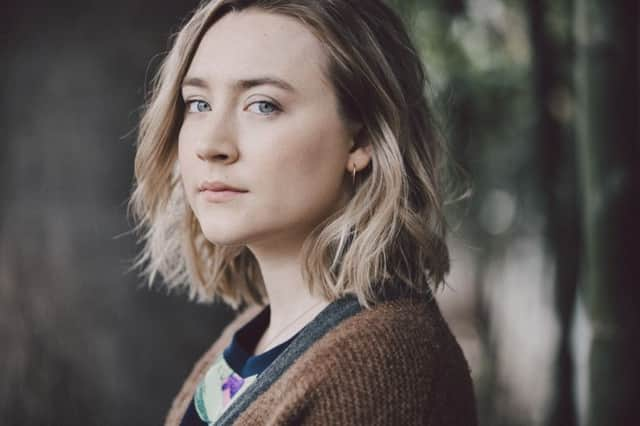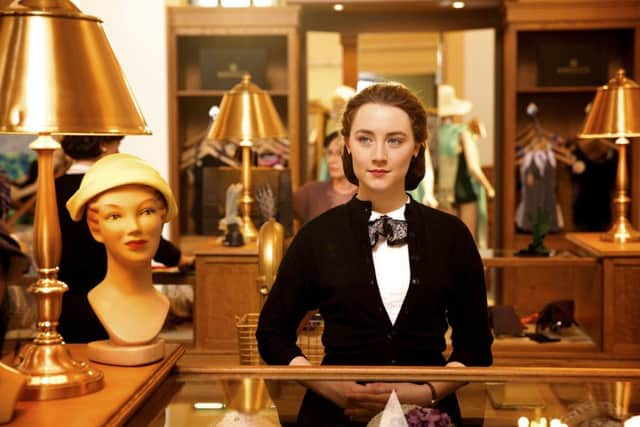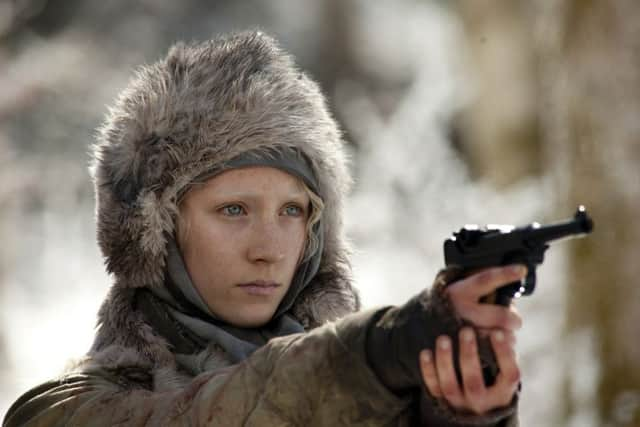Saoirse Ronan, an ordinary girl with extraordinary talent


‘Oh it’s so nice to hear a Scottish accent,” says Saoirse Ronan, greeting me with disarming warmth. “I haven’t heard one all day. Thank god there’s a Scot here.”
I’d like to return the compliment. Ronan’s Irish accent isn’t quite as emerald green as it is in her new movie – the low key but rather magnificent Brooklyn – but it would still count as a brogue. And if one word features more than any other as she talks, it’s “feckin”. A girl after my own heart.
Advertisement
Hide AdHas there been an onslaught of journalists asking her tricky questions? Her eyebrows rise, those trademark light blue eyes growing wider. “It’s only the first day,” she says. “Listen, I’m not going to moan about it because it’s great that we’re doing so much press for this film, but I turned to my publicist and said, ‘F***, this is only the first day’.” She hoots with laughter.


“You know what it is,” she says, “it’s just hard talking about yourself constantly. That’s what I find. After a day of press it’s like I’ve just talked about myself for the entire day.” She shakes her head. I wonder what the best activity might be to set her right again after such an ordeal. “What would you do?” she wonders aloud. “Go to a f***ing homeless shelter. Give something back.”
There’s a phrase Ronan uses a lot when she speaks – “You know what it’s like”. And sometimes I do know, for example when she’s talking about the way that the Irish, like the Scots, use humour to cope with grief and loss; or when she’s remembering her feeling of wanting to move away from home to stand on her own feet.
Yet the suggestion that – like me – Ronan is ordinary couldn’t be further from the truth. The 22-year-old has been appearing in movies since she was 11. She made her debut in a prime-time Irish TV series called The Clinic, in 2003. She played Michelle Pfeiffer’s daughter in I Could Never Be Your Woman in 2007. Then it was on to the adaptation of Ian McEwan’s Atonement as Briony Tallis, the girl whose confusion and misunderstanding of the adults around her leads to tragic consequences. Ronan was nominated for the best supporting actress Oscar in 2008 for her role.
But still, here she is, tucked in the corner of a sofa looking like any one of the young women I’ve just walked past on Oxford Street on my way here. Low-key is probably the way to describe it. Or off-duty. I’m used to meeting actresses who appear to be primed and ready for a high fashion photo shoot (even when they’re meeting journalists who look like they’ve just cleaned out the garden shed) replete with heels there’d be no way they could walk in if they dared to get up from the plump sofas upon which they sit. So when you interview someone who comes across just like anyone you might see in a coffee shop or on a bus, and sounds like them too, it’s noteworthy.


Maybe that’s why Ronan is so luminescent as Eilis Lacey, the young Irish woman she plays in Brooklyn. “There’s nothing extraordinary about this life,” she says. “She’s not a superhero, she’s ordinary. But it’s empowering because it’s about her having the gumption and strength to take control of her own choices.
Advertisement
Hide Ad“It’s encouraged me to look at the people in my life with a real sense that what each person is going through is momentous for them – it is as big as it’s going to get. From the outside it might seem quite boring, but for them it’s everything.
“It was a really important role for me to do because I didn’t want to get to the stage where I’d done so many ethereal, other-worldly things that I’d lost connection to real life. That’s what I like; I don’t connect so much to sci-fi, I want to see real people.”
Advertisement
Hide AdAdapted from Colm Tóibín’s novel and directed by John Crowley (best known for Boy A and Intermission) the film traces Eilis’s transformation from girl to woman, mirrored in her journey from Ireland to America and through her relationships with two men, the open-hearted Italian plumber Tony (Emory Cohen), who is Brooklyn born and bred, and back in Ireland with Jim Farrell (Domhnall Gleeson), one of the loathed rugby-club boys who, it transpires, is really rather charming.
It is a nuanced, moving portrait not only of the immigrant experience, the dislocation and discombobulation of being pulled out of one environment as familiar as your slippers and thrown into another as strange as another planet, but also of what it is to grow up – the sadnesses and losses as well as the freedoms and fun. With a stellar supporting cast, including Jim Broadbent as the benevolent priest helping his countryfolk to settle in their new home, and a hilarious turn by Julie Walters as the landlady, Mrs Kehoe, the realities and loneliness of Eilis’s new life are beautifully drawn.
Ronan is more proud and personally entangled with her latest movie than any other project on which she’s worked. There are personal parallels and family connections, the themes have touched her more deeply than on any other movie, and so that’s why she says unabashedly with this one she was a “basket case”.
“It was overwhelming,” she says. “There were times when we were shooting in Enniscorthy, which is 20 minutes from where I grew up. I used to go to the cinema there when the one screen where we lived didn’t have the film on that we wanted to see. So I’ve grown up going to that place.” Lots of locals were extras, and although Ronan loved the excitement it caused (“it’s the first movie ever to be made there”) it brought with it a kind of pressure.
“There were a lot of eyes on me,” she says. “And there’s a lot of tension there. There was one point one day when I felt it so much and I wasn’t sure what I was doing. It was only a few days into the job, and I had to go into a corner and just hid for a second and blanked everyone else out. It was a lot.
“To work at home and be on an Irish film, the responsibility was huge. I put a lot of pressure on myself. Between myself and John [Crowley], we were like, ‘We have to make this as authentic as we can.’ Number one, there haven’t been enough representations of real Ireland, there’s been this diddly, idle version for so long. But also to see an Irish woman and her journey.”
Advertisement
Hide AdShe looks at me and shrugs. It’s a big deal to her, a big role, her first role as an adult even though it’s a transition that unfolds on screen, and she lives up to it with some style. “There are so many scenes that could have been melodramatic, but it never is; everything is reserved, nothing is said verbally, it is all in their expressions and how they hold their fork and knife.”
This kind of acting is Ronan’s forte, of course. It’s what Ian McEwan said of her way back when she played Briony Tallis: “She gives us thought processes right on screen, even before she speaks, and conveys so much with her eyes.” There was something similarly still and yet immensely moving about her performance in Hanna with Cate Blanchett and Eric Bana. As one reviewer rather breathlessly put it, describing her performance in Brooklyn, Ronan “seems to have perfected an understated technique as emotionally devastating to audiences as icebergs are to transatlantic ocean liners”.
Advertisement
Hide AdWhen I compliment her, she is gracious and looks genuinely bashful. “He captures women, so feckin’ well,” she says, sliding the praise towards Nick Hornby, whose screenplay is perfectly understated. “I don’t know how he does it, because he keeps it so subtle. It’s never overly dramatic. In a way it was the hardest thing I’d ever done.”
And the emotional demands of playing Eilis were all the greater because of the parallels with her own family’s story. Ronan’s mum and dad, Paul and Monica, emigrated to New York from Ireland when they were in their mid-20s. “Young enough” is how Ronan describes it. Ronan, their only child, was born in New York in 1994. The family moved back to Ireland when she was three. And there were other resonances too. “Day-to-day I felt more and more strongly about it because I realised it was my life, it was what I was going through and I’ve never had that before. Never.”
Back in 2012, when she was 19, Ronan made the decision to leave home and head to London. When she signed on to Brooklyn she hadn’t yet made the move, but by the time the film was being made, she’d had six months of living on her own. She was, she says, in a kind of grieving process.
“I was so ready to leave home. I was very aware of growing up in an industry where everything is done for you and everything is set out and planned; you don’t really have to think for yourself when it comes to every day stuff.”
Ronan was maturing but not in a “natural way” she says. She wanted to learn how to be independent, to do her own washing and pay her own bills. “The first thing that struck me when I moved away was if I was hungry and there was no food in the house, I had to go out and get it. And I had to use my money and take it back and cook it and eat it and clean up after.” She laughs. “It’s not as though I had a silver spoon in my mouth at any stage of my life but my washing was done for me and mam and dad made dinner and that’s how it was. Suddenly I was dependent just on myself and it was scary. And it’s also really simple and it sounds kind of petty, but you have to learn it.”
So when it came to telling Eilis’s story, Ronan had plenty to draw on. “I was very, very raw at that point. John was almost like my bloody therapist, listening to me every day. We couldn’t believe how much Eilis and I mirrored each other. I was like an open feckin’ wound when we were doing it. There were times in scenes like that one round the dinner table when you did want to sob, or you did want to make everything big and open and over-emotional, but we couldn’t.
Advertisement
Hide Ad“This is the fascinating thing about women, and I think in particular Celtic women. We deal with things to the brink of falling apart. We deal with things until we just can’t do it any more. To have that kind of stamina, to keep going like that, is a real female trait. To have that emotional strength, which is really quite different to how a man deals with things typically, is really fascinating to watch.”
Ronan knows that for all the people like Eilis there was a finality to their separation that she’s never had to face. But the losses and also the journey to becoming a grown-up isn’t so very different.
Advertisement
Hide Ad“As soon as she got on that boat, it was possible that she was never coming back. When I think of the difference between then and how I travel now – I could FaceTime my mam right now or WhatsApp her or whatever and it’d feel like she was in the next room. So she never really feels that far away. But to literally be on your own. My mam is amazing. When she wanted to talk to her sister, my Auntie Margaret who she was very close to, she would have to get the right change, go to the local pub and use the payphone to talk to her. That was once every few months.
“There are so many stories that she’s told me and I’ve thought, ‘Why didn’t you just go home?’ I’ve asked her so many times, ‘Why didn’t you just leave?’ Her answer has always been that she couldn’t give up and go back with her head in her hands. She had to ‘tough it out’.
“I would’ve been the same. It was in her own spirit that she felt she had to stick it out and get through it and she did. They both did. Even when she had me, she wanted to have me in New York so that if I ever went back to America, which I did, I’d never have to go through what they did. It’s amazing.
“I talk to my mam six times a day just to tell her what I’m doing, whereas she just had to get on with it.”
It’s moving to watch Eilis grow up, transforming from a girl who is catapulted into the adult world reluctantly but who survives. It’s also interesting watching Ronan playing this part, because in a sense we have watched a lot of her growing up, on screen at least.
“Film has been a huge part of my childhood,” Ronan says. “I was never a Hollywood kid and when people used to say ‘We’ve watched you grow up on screen,’ I was like, ‘No, no you haven’t, there’s another part that you guys don’t know about which is true.’ But film has been a huge part of my life.”
Advertisement
Hide AdBrooklyn may be a watershed moment in Ronan’s career. It’s not that it’s the first fine performance she’s given – and with an upcoming role in the Ivo van Hove production of The Crucible on Broadway alongside Ben Whishaw and Sophie Okonedo, it’s unlikely that it will be the last. But it is her first role as an adult.
“I haven’t stopped thinking about it since I made the film,” Ronan says. “It’s like that favourite book that you read when you were a teenager that completely spoke to you. I started reading I Know Why The Caged Bird Sings the other day, and Oprah has written the foreword. She went through all the same stuff that Maya Angelou went through when it came to abuse and where she grew up and all that stuff, and that was her book, it was what spoke to her. And I feel like I had that really significant experience with a film that I’ve been involved in. It’s amazing.”
Twitter: @scottiesays
• Brooklyn is on general release from Friday